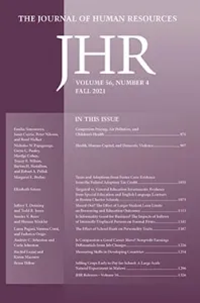移民执法的意外后果:家庭服务和高学历母亲的工作
IF 6
1区 经济学
Q1 ECONOMICS
引用次数: 6
摘要
美国加强了移民执法,但几乎没有证据表明它对美国出生的个人的劳动结果产生了影响。利用跨区域的大型联邦执行政策安全社区(SC)的交错推出,我们估计了具有时间和位置固定效应的差中差模型。我们发现,SC减少了受过大学教育的美国出生的母亲和年幼的孩子的劳动力供应。如果儿童在3岁以下接触SC,对劳动力供应的负面影响将持续一段时间。我们进一步表明,由于无证移民劳动力供给减少,外包家庭生产的成本增加是一个重要机制。*我们感谢Patricia Cortes、Delia Furtado、Gaurav Khanna、Brian Kovak、Emily Lawler、Michelle Marcus、Terra McKinnish、Kathleen McGarry、Anita Mukherjee、Emily Nix、Pia Orrenius、Analisa Packham、Sandra Rozo、Sarada、Na’ama Shenhav、Jenna Stearns、Sebastian Tello-Trillo、Jose Tessada、Alisa Tazhitdinova以及参加科罗拉多大学丹佛分校、夏威夷应用微型一天会议、哥伦比亚第一届年度经济会议、人口普census Bureau、休斯顿大学、卡耐基梅隆大学、匹兹堡大学、哥伦比亚大学、埃塞克斯大学、ICESI、康涅狄格大学、德克萨斯农工大学、北卡罗来纳大学格林斯博罗分校、圣保罗大学、布鲁金斯研究所、加州大学洛杉矶分校国际移民研究中心和加州大学圣地亚哥分校比较移民研究中心、新兴移民学者研讨会、行为科学研究所和科罗拉多大学人口中心、公共政策分析与管理协会,南方经济协会,CSWEP在西方经济协会的会议,以及美国人口协会。我们也感谢Reid Taylor、Tyler Collinson、Evan Generoli和Gabrielle Toborg出色的研究协助。我们作为TRAC研究员从雪城大学获得了TRAC数据。科洛伊·伊斯特得到了科罗拉多大学丹佛分校研究服务办公室的资助。一如既往,所有的错误都是我们自己的。这项工作的先前版本在标题下分发:“增加移民执法对高技能公民妇女劳动力供应的影响”和“移民执法的意外后果:家庭服务和高技能妇女的工作”†科罗拉多大学丹佛分校和IZA劳动经济研究所,电子邮件:chloe.east@ucdenver.edu‡科罗拉多大学丹佛分校,电子邮件:andrea.velasquez@ucdenver.edu本文章由计算机程序翻译,如有差异,请以英文原文为准。
Unintended Consequences of Immigration Enforcement: Household Services and High-Educated Mothers’ Work
Immigration enforcement has intensified in the U.S., however, there is little evidence on its effect on U.S.-born individuals’ labor outcomes. Exploiting the staggered rollout of a large, federal enforcement policy–Secure Communities (SC)–across local areas, we estimate a difference-in-differences model with time and location fixed effects. We find that SC reduced the labor supply of collegeeducated U.S.-born mothers with young children. If SC exposure occurred when children are below age 3, the negative effects on labor supply persist over time. We further show increased cost of outsourcing household production, due to reduced undocumented immigrants’ labor supply, is an important mechanism. ∗We are grateful to Patricia Cortes, Delia Furtado, Gaurav Khanna, Brian Kovak, Emily Lawler, Michelle Marcus, Terra McKinnish, Kathleen McGarry, Anita Mukherjee, Emily Nix, Pia Orrenius, Analisa Packham, Sandra Rozo, Sarada, Na’ama Shenhav, Jenna Stearns, Sebastian Tello-Trillo, Jose Tessada, Alisa Tazhitdinova, and seminar participants at the University of Colorado Denver, Hawaii Applied Micro Oneday Conference, First Annual Colombian Economics Conference, Census Bureau, University of Houston, Carnegie Mellon University, University of Pittsburgh, Columbia University, University of Essex, ICESI, University of Connecticut, Texas A&M University, University of North Carolina Greensboro, University of Sao Paulo, the Brookings Institute, UCLA Center for the Study of International Migration and the UCSD Center for Comparative Immigration Studies Emerging Immigration Scholar Workshop, Institute of Behavioral Science and the CU Population Center, Association for Public Policy Analysis and Management, Southern Economic Association, CSWEP sessions at the Western Economic Association, and the Population Association of America. We are also grateful to Reid Taylor, Tyler Collinson, Evan Generoli and Gabrielle Toborg for excellent research assistance. We obtained the TRAC data from Syracuse University as TRAC Fellows. Chloe East was supported by funding from the Office of Research Services at the University of Colorado Denver. As always, all errors are our own. Previous versions of this work were circulated under the titles: “The Effect of Increasing Immigration Enforcement on the Labor Supply of High-Skilled Citizen Women” and “Unintended Consequences of Immigration Enforcement: Household Services and High-Skilled Women’s Work” †University of Colorado Denver and IZA Institute of Labor Economics, email: chloe.east@ucdenver.edu ‡University of Colorado Denver, email: andrea.velasquez@ucdenver.edu
求助全文
通过发布文献求助,成功后即可免费获取论文全文。
去求助
来源期刊

Journal of Human Resources
Multiple-
CiteScore
7.00
自引率
1.90%
发文量
53
期刊介绍:
The Journal of Human Resources is among the leading journals in empirical microeconomics. Intended for scholars, policy makers, and practitioners, each issue examines research in a variety of fields including labor economics, development economics, health economics, and the economics of education, discrimination, and retirement. Founded in 1965, the Journal of Human Resources features articles that make scientific contributions in research relevant to public policy practitioners.
 求助内容:
求助内容: 应助结果提醒方式:
应助结果提醒方式:


